-
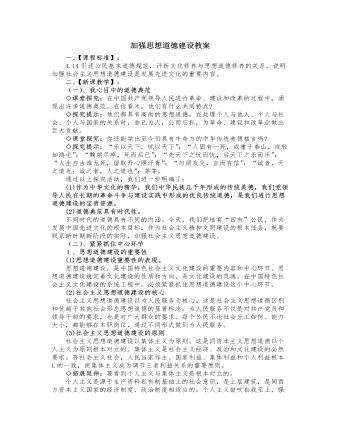
人教版高中政治必修3加强思想道德建设教案
(2)社会主义思想道德体系应该与社会主义法律规范相协调。法治和德治,从来都是相辅相成、相互促进的。法治以法律的权威性和强制性规范社会成员的行为;德治以道德的说服力和感召力提高社会成员的思想认识和道德觉悟。建设中国特色社会主义,既要加强社会主义法制建设,依法治国;也要加强社会主义思想道德建设,以德治国。◇课堂探究:你能否引述与上述道德规范相关法律条文。◇探究提示:上述道德规范见诸很多法律当中,例如:2O()5年4月27日颁布的《中华人民共和国公务员法》规定:公务员应当“忠于职守,勤勉尽责,服从和执行上级依法作出的决定和命令”“遵守纪律,恪守职业道德,模范遵守社会公德。”修订后的《中华人民共和国婚姻法》规定:“夫妻应当互相忠实,互相尊重;家庭成员间应当敬老爱幼,互相帮助,维护平等、和睦、文明的婚姻家庭关系。”
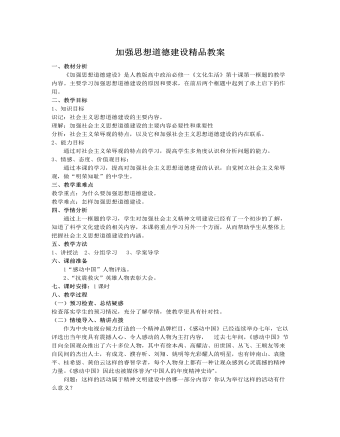
人教版高中政治必修3加强思想道德建设精品教案
一、教材分析《加强思想道德建设》是人教版高中政治必修一《文化生活》第十课第一框题的教学内容。主要学习加强思想道德建设的原因和要求,在前后两个框题中起到了承上启下的作用。二、教学目标1、知识目标识记:社会主义思想道德建设的主要内容。理解:加强社会主义思想道德建设的主要内容必要性和重要性分析:社会主义荣辱观的特点,以及它和加强社会主义思想道德建设的内在联系。 2、能力目标通过对社会主义荣辱观的特点的学习,提高学生多角度认识和分析问题的能力。3、情感、态度、价值观目标:通过本课的学习,提高对加强社会主义思想道德建设的认识,自觉树立社会主义荣辱观,做“明荣知耻”的中学生。三、教学重难点教学重点:为什么要加强思想道德建设。教学难点:怎样加强思想道德建设。

人教版高中政治必修3加强思想道德建设教案
学生活动三:让学生阅读教材P108回答:(投影显示,然后让学生对这两个概念进行比较)总的说,法治与德治是相辅相成、相互促进的。设计意图:让学生弄清法治与德治的区别,并理解法治与德治的联系。教师过渡:(提问)我们进行思想道德建设的两个宝贵资源是什么?这又说明社会主义思想道德体系建设应与什么相承接?(3)社会主义思想道德体系应该与中华民族传统美德相承接①传统美德是中华传统道德中的精华学生活动四:列举中华民族的传统美德②今天倡导的基本道德规范是对中华民族传统美德的继承、发展和创新教师活动:(投影显示)我国《公民道德实施纲要》提出了20个字的基本道德规范。可以具体分为10个方面:爱国守法明礼诚信团结友善勤俭自强敬业奉献教师过渡:在我们的社会主义社会里,是非、善恶的界限绝对不能混淆,坚持什么、反对什么,倡导什么、抵制什么,都必须旗帜鲜明。所以我们必须树立社会主义荣辱观。(4)树立社会主义荣辱观——八荣八耻
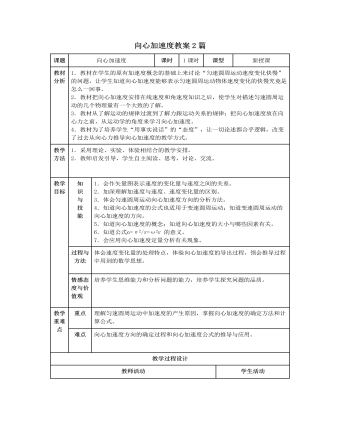
人教版新课标高中物理必修2向心加速度教案2篇
1.教材在学生的原有加速度概念的基础上来讨论“匀速圆周运动速度变化快慢”的问题,让学生知道向心加速度能够表示匀速圆周运动物体速度变化的快慢究竟是怎么一回事。2.教材把向心加速度安排在线速度和角速度知识之后,使学生对描述匀速圆周运动的几个物理量有一个大致的了解。3.教材从了解运动的规律过渡到了解力跟运动关系的规律;把向心加速度放在向心力之前,从运动学的角度来学习向心加速度。4.教材为了培养学生“用事实说话”的“态度”,让一切论述都合乎逻辑,改变了过去从向心力推导向心加速度的教学方式。1.采用理论、实验、体验相结合的教学安排。2.教师启发引导,学生自主阅读、思考,讨论、交流。知识与技能1.会作矢量图表示速度的变化量与速度之间的关系。2.加深理解加速度与速度、速度变化量的区别。3.体会匀速圆周运动向心加速度方向的分析方法。4.知道向心加速度的公式也适用于变速圆周运动;知道变速圆周运动的向心加速度的方向。
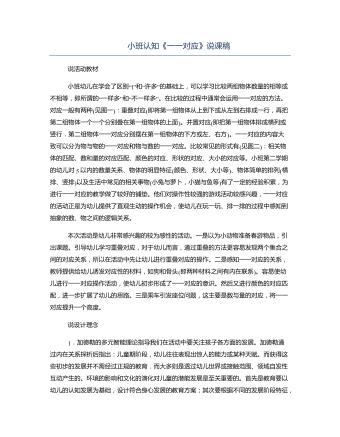
小班认知《一一对应》说课稿
小班幼儿在学会了区别“l”和“许多”的基础上,可以学习比较两组物体数量的相等或不相等,即所谓的“一样多”和“不一样多”。在比较的过程中通常会运用一一对应的方法。对应一般有两种(见图一):重叠对应(即将第一组物体从上到下或从左到右排成一行,再把第二组物体一个一个分别叠在第一组物体的上面)。并置对应(即把第一组物体排成横列或竖行.第二组物体一一对应分别摆在第一组物体的下方或左、右方)。一一对应的内容大致可以分为物与物的一一对应和物与数的一一对应。比较常见的形式有(见图二):相关物体的匹配、数和量的对应匹配、颜色的对应、形状的对应、大小的对应等。小班第二学期的幼儿对5以内的数量关系、物体的明显特征(颜色、形状、大小等)、物体简单的排列(横排、竖排)以及生活中常见的相关事物(小兔与萝卜,小猫与鱼等)有了一定的经验积累,为进行一一对应的教学做了较好的铺垫。他们对操作性较强的游戏活动较感兴趣,一一对应的活动正是为幼儿提供了直观生动的操作机会,使幼儿在玩一玩、排一排的过程中感知到抽象的数、物之间的逻辑关系。

新人教版高中英语必修3Unit 5 The Value of Money- Discovering Useful Structure教学设计
Step 3 Meaning1. 过去将来时表示从过去某一时间来看将要发生的动作或存在的状态, 常用在宾语从句中。一般由“would/should +动词原形”构成。She hoped that they would meet again someday. 她希望将来有一天他们能再见面。2. was/were going to+动词原形: 表示过去将要发生或很有可能发生的动作, 常用于口语中, 表示预言、意图或者打算等。He was going to start work the following week. 他打算下星期开始工作。3. was/were about to do: 常用来表示即将发生的动作, “刚要/正要做……”。注意该结构不与任何时间状语连用。I felt that something terrible was about to happen. 我感到某种可怕的事情即将发生。4.was/were to do: 表示“曾计划做某事”, 如果表示“本来计划做某事, 动作没实现”, 则需用 “was/were to have done”。She said she was to have told me about the accident. 她说她本来想告诉我关于事故的事。5.Start, go, come, leave, see, meet等动词的过去进行时: 表示就过去某一时刻而言即将发生的动作。She was coming later. 她随后就来。I had just put on my overcoat and was leaving to visit a friend of mine. 我刚穿上外套要去看我的一个朋友。

新人教版高中英语必修3Unit 5 The Value of Money-Listening &Speaking教学设计
Step 4: Listen again and decide if the following statements are true (T) or false (F).1 It was the first time Chen Liyan's story was reported. T口 F口2 Chen found 10,000 yuan in a small plastic bag in Taiyuan railway station口 F口3 Wang Zheng apologized to Chen because he couldn't offer her more money. T口 F口4 Chen took out a large loan to cure her daughter, T口 F口5 Wang set up a fundraising website for Chen's daughter after Chen told him about her situation. T口 F口Step 5:After listening, discuss the questions.1 What kind of person do you think Chen Liyan is?Chen Liyan is generous and honest because she returned a large sum of money to the owner.2 Did Chen return the money because she didn't need it?No. She returned the money because it was the right thing to do. Evidence for this is that she refused to accept the reward money because she felt that it had not been earned. 3 Is it common for people to do what Chen did?It depends on the culture. In some countries it is quite common to return money that has been found. In other countries, people believe "Finders are keepers!" 4 How did Wang Zheng feel about the return of his money?He must have been very happy and relieved to have gotten his money back. We know this because he thanked Chen repeatedly and even offered her a reward.5 Why did Ma Dongbao tell Wang about Chen's family?He must have had great sympathy for Chen and her daughter and wanted to help them.'We know this because he arranged help for them. 6 How did the news reporter feel about Chen's actions?The news reporter felt that it showed that money wasn't the most important thing in life. We know this because the reporter told us that this is what Chen believes. and then said, “that's a great attitude to take."

新人教版高中英语必修3Unit 5 The Value of Money-Reading and Thinking教学设计一
Everybody wants to get wealth.In today’s material world,making money or becoming wealthy symbolizes a person’s success and capability. Many people just make every effort, pay any price to attain greater wealth. With money,they can buy nice, large apartments in nice neighborhood. With money they can own luxurious cars. Wealth seems to bring all happiness in life.But is wealth the only road to happiness? Not really. There are many things in the world, which are beyond the means of money, such as friendship, love, health and knowledge. People are so preoccupied with struggling for money that they have no time or would not take the time to form or maintain friendship. What happiness can they feel living as lonely miserable creatures without love or friends in the world even if they accumulate tremendous wealth?In my opinion, people can’t do anything without money, but money is not everything. What money will bring you depends on your personal belief and goal in life. If you are kind enough to help others, especially the poor, money is a good thing to you. With it, you can do much more for the benefit of people and your country, and it will add to your own happiness. If you want money just for your own needs, you’ll never be satisfied or happy. In a word,you should have money spent for more people. Only then can money be the source of your happiness.Step 8 Homework4 students in a group, one acts Roderick, one Oliver, one servant and the fourth one acts Henry Adams, then listen to the tape, pay more attention to the difference between American English and British English in pronunciation, stress, tone.

新人教版高中英语必修3Unit 5 the value of money-Reading For Writing教学设计一
【参考范文】Narrator:(Henry is smiling as he leaves the restaurant. As he is walking down the street, he sees a sign for a place that cuts hair. He decides to get it cut. )H=Henry;B=Barber;R=rude manH:Good afternoon, I'd like to get a cut, if I may. (The barber looks at Henry's hair and continues cutting another man's hair. )Er, I'd really like a haircut. As you can see it's much too long. B:(in a rude manner) Yes, I can see that. Indeed, I can. H:Fine, well I'll have a seat then. (He sits in one of the barber's chairs. The barber turns to look at Henry. )B:It's quite expensive here, you know!Are you sure you can afford it?H:Yes. I think so. (In comes the rude man. )R:Hey you there. I need a haircut quickly. Can you do me straightaway?B:All right, then, get in the chair and I'll see what I can do. R:Thank you. (sits down in one of the barber's chairs)H:Excuse me, but I was here first. Aren't you going to do my hair first?B:This man's in a hurry. H:Well so am I!I insist that you cut my hair first. B:OK, but I'll have to be quick. This gentleman is waiting. H:Thank you. (They both become quiet. After his hair is cut, the barber tells Henry how much he must pay. Henry shows the barber the bank note. )B:Why, Mr . . . (looks shocked)H:Adams. Henry Adams. I'm sorry, I don't have any change. R:You're that Mr Adams! Well,I'm glad I waited or I might never have known it was you. B:Why, Mr Adams, please don't worry!(wearing a big smile) Nothing to worry about!Nothing at all!Please come back any time, even if you only need too little hairs cut!It will be my honour to serve you!

新人教版高中英语选修2Unit 5 First Aid-Discovering useful structures教学设计
You have no excuse for not going.你没有理由不去。He was punished for not having finished his homework.他因未完成作业而受到惩罚。2.动词ing形式复合结构由物主代词或人称代词宾格、名词所有格或普通格加动词ing,即“sb./sb.'s+doing”构成。动词ing形式的复合结构实际上是给动词ing形式加了一个逻辑主语。动词ing形式的复合结构有四种形式:①形容词性物主代词+动词ing②名词所有格+动词ing③代词宾格+动词ing④名词+动词ingHer coming to help encouraged all of us.她来帮忙鼓舞了我们所有人。The baby was made awake by the door suddenly shutting.这个婴儿被突然的关门声吵醒了。Can you imagine him/Jack cooking at home?你能想象他/杰克在家做饭的样子吗?无生命名词无论是作主语还是作宾语都不能用第②种形式。Tom's winning first prize last year impressed me a lot.汤姆去年得了一等奖使我印象深刻。Do you mind my/me/Jack's/Jack leaving now?你介意我/杰克现在离开吗?Excuse me for my not coming on time.很抱歉我没能按时来。His father's being ill made him worried.他父亲病了,他很担心。We are looking forward to the singer's/the singer to give us a concert.我们盼望着这位歌手来给我们举办一场演唱会。

新人教版高中英语必修3Unit 5 The Value of Money-Listening &Speaking&Talking教学设计
4. A:We’d like to have someone to say a word at the beginning to welcome the group.B:↙Who?A:We thought that you or Dr.Johnson might do it.B用降调说Who,其意思是问,对方想让谁在开场时致欢迎词。Step 6 Pronunciation---Practice1. Listen to the short conversation and mark the intonation with ↗, ↙ or ↙, ↗. Then discuss with a partner what they intend to convey by using different intonation.Owner: You know what ?↗ It’s a million-pound bank note↙.Waiter 1: Really ?↗(question)Waiter 2: Really !↙(unbelievable and surprised)Waiter 3: Really ?!↙↗(first question then surprised)2. Listen to the conversations. Underline the parts that are stressed and mark the intonation. Then talk about the implied meanings of the responses with different intonations. Listen again and repeat.1) Henry: It’s a nice suit.Owner: Oh, it’s perfect!↙(The intonation means it is very suitable for Henry.)2) Henry: Well, that’s very kind of you.Owner: Kind, sir ?↗(what you said is not right) No, it’s kind of you. You must come whenever you want and have whatever you like. Just having you sit here is a great honour !!↙(welcome you to come again)3)Henry:Well, to be honest, I have none. Oliver:(happily) What luck!(excited) Brother↗, what luck!↙(It means “Didn’t you hear it?”)Henry: Well, it may seem lucky to you but not to me!↗(angry) If this is your idea of some kind of joke, I don’t think it’s very funny. Now if you’ll excuse me, I ought to be on my way.↙(If so, I would leave.)Roderick: Please don’t go↙...(hope Henry can wait for a moment)Part B Viewing and Talking---Describe people’s changing attitudes in a film clipStep 1 Before-listening---Tell the filmYou are going to watch part of the film The Million Pound Bank Note. Look at these photos and guess what happens in the film.

新人教版高中英语必修3Unit 5 The value of money-Reading and Thinking教学设计二
? Could you offer me some kind of work here?? I don’t want your charity, I just want an honest job.? Careless: I landed in Britain by accident.Step 7:Consolidation.? Find Henry? Roderick and Oliver were I .making a bet when they saw Henry, a poor young man. ? Know Henry? About a month ago, Henry was sailing and later he found himself carried out to sea by a strong wind. Fortunately, he 2.was spotted by a ship. And it was the ship that brought him to 3.England? Offer money to Henry ? Oliver and Roderick gave Henry a letter and told him that there was money in it. They 4.persuaded him to accept it, and made him 5.promise that it wouldn't be opened until 2 o'clock.Step 8:Language pointsa large amount of: a large quantity of; a great deal ofe.g. They bought a large amount of furniture before they moved their new house.make a bet: make an arrangement to risk money, etc. on an event of which the result is doubtful.e.g. We made a bet on the result of the match.permit sb to do something: allow somebody to do somethinge.g. My mother doesn’t permit me to ride in the street after it rained.by accident: as a result of chancee.g. I only found it by accident.stare at: look at somebody or something with the eyes wide open in a fixed gaze( in astonishment, wonder, fear, etc)to be honest: to tell you the truth; to be franke.g. To be honest, I don’t think we have a chance of winning.Step7 Homework:What do you think will happen to Henry? Will the bank-note help him or get him into trouble?

新人教版高中英语必修3Unit 5 The Value of Money-Reading for Writing教学设计二
2. 您能看到, 我头发太长了。You can see that my hair is much too long.3. 无论什么时候, 只要您想回来就回来。Please come back whenever you want.4. 您仅有很少的头发要理! You only have too little hair to cut !5. 为您服务是我的荣幸!It is my honour to serve you!Step 9 Writing(Henry is walking down the street when he sees a sign for a place that cuts hair. He decides to have it cut. )H=Henry B=BarberH: Good afternoon, I’d like to have my hair cut, if I may. (The barber looks at Henry’s hair and continues cutting another man’s hair. ) Er, I’d really like a haircut. As you can see it’s much too long. B: (in a rude manner) Yes, I can see that. Indeed, I can. H: Fine, well, I’ll have a seat then. (He sits in one of the barber’s chairs. The barber turns to look at Henry. )B: It’s quite expensive here, you know! Are you sure you can afford it?H: Yes. I think so. (After his hair is cut, the barber tells Henry how much he must pay. Henry shows the barber the bank note. )B: Why Mr. . . (looks shocked)H: Adams. Henry Adams. I’m sorry. I don’t have any change. B: Please don’t worry! (wearing a big smile) Nothing to worry about! Nothing at all! Please come back whenever you want, even if you only have too little hair to cut! It will be my honour to serve you!Step 10 Pair workExchange drafts with a partner. Use this checklist to help your partner revise his/her draft.1. Are all the elements of a play included and in good order ?2. Do the character use suitable language ?3. Are the stage directions clear and useful ?4. Is the plot clear and exciting enough ?
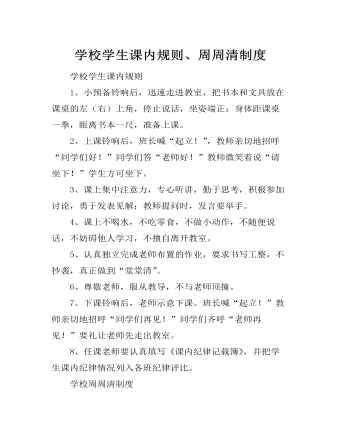
学校学生课内规则、周周清制度
2、上课铃响后,班长喊“起立!”,教师亲切地招呼“同学们好!”同学们答“老师好!”教师微笑着说“请坐下!”学生方可坐下。 3、课上集中注意力,专心听讲,勤于思考,积极参加讨论,勇于发表见解;教师提问时,发言要举手。 4、课上不喝水,不吃零食,不做小动作,不随便说话,不妨碍他人学习,不擅自离开教室。 5、认真独立完成老师布置的作业,要求书写工整,不抄袭,真正做到“堂堂清”。
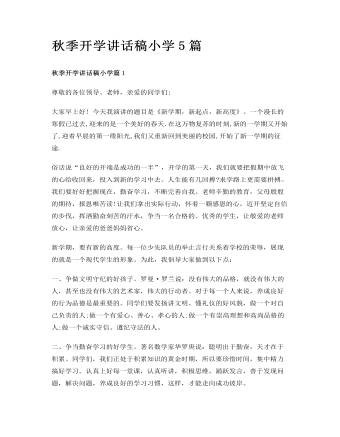
秋季开学讲话稿小学5篇
“民以食为天,食以安为先”,小小餐桌不仅传承了中华民族勤俭节约的优秀文化和传统美德,更承载着人民群众的身体健康和生命安全。为倡导“文明用餐,安全健康”的生活方式,引领“崇俭戒奢、文明守信”新风尚。为此,向全体师生发出倡议:一、倡导传统美德,弘扬文明新风。大力弘扬中华民族的传统美德,积极参与“文明餐桌”行动,“七不”劝导行动。“不乱扔垃圾、不随地吐痰、不乱贴乱画、不高空抛物、不大声喧哗、不扰乱公共秩序、不损害侵占公物”二、倡导勤俭惜福,反对铺张浪费。每位同学要崇尚绿色消费,理性消费,按需装饭,厉行节约,反对浪费,推行“光盘行动”,做到不剩饭、不剩菜。自觉遵守公共道德规范,爱护用餐环境,不在餐饮场所喧哗,注重餐饮礼仪,崇尚文明礼让。
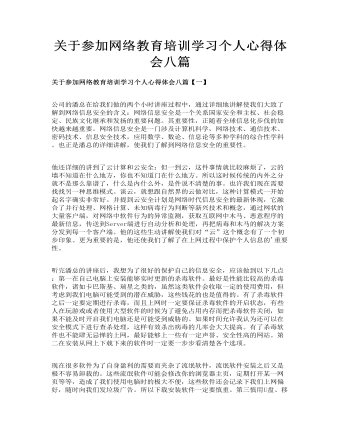
关于参加网络教育培训学习个人心得体会八篇
现在很多软件为了自身盈利的需要而夹杂了流氓软件,流氓软件安装之后又是极不容易卸载的。这些流氓软件可能会修改你的浏览器主页,定期打开某一网页等等,造成了我们使用电脑时的极大不便,这些软件还会记录下我们上网偏好,随时向我们发垃圾广告。所以下载安装软件一定要慎重。第三慎用U盘、移动硬盘之类的存储设备。某些破坏性的病毒可能导致移动存储设备损坏。我们在使用U盘之类的存储设备时也要小心谨慎,打开U盘时尽量不要双击打开,这样很可能会激活存在于里面的木马,使用打开前最好能够先杀一遍毒,甚至我们可以专门去网上搜取U盘木马专杀来预防电脑再次被感染。第四尽量不要在互联网上公布个人信息。除非是万不得已,否则不要公布自己任何详细的信息,以防被不良分子利用。另外在网上不要随意公布自己的邮箱,因为邮箱是一个十分便利的切入口来搜取你的个人信息,我们在各个网站注册时一般都会被要求留下邮箱,这样在这个过程中或多或少我们都会偷漏一些个人信息,如果通过搜取邮箱的方法获得你在各个网站上公布的个人信息经过综合整理很可能是自己更多的信息被公布出来。更多的我们考虑的自身安全问题,公布照片不仅使我们信息安全得不到保护,甚至现实中我们人身安全也可能因为一张照片而受到威胁。
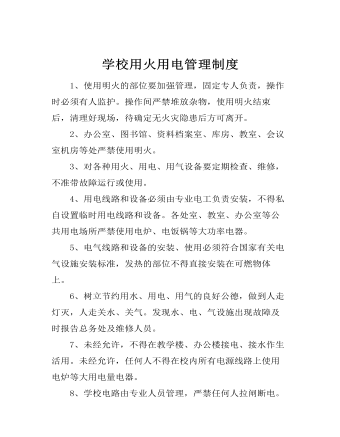
学校用火用电管理制度
2、办公室、图书馆、资料档案室、库房、教室、会议室机房等处严禁使用明火。 3、对各种用火、用电、用气设备要定期检查、维修,不准带故障运行或使用。 4、用电线路和设备必须由专业电工负责安装,不得私自设置临时用电线路和设备。各处室、教室、办公室等公共用电场所严禁使用电炉、电饭锅等大功率电器。 5、电气线路和设备的安装、使用必须符合国家有关电气设施安装标准,发热的部位不得直接安装在可燃物体上。
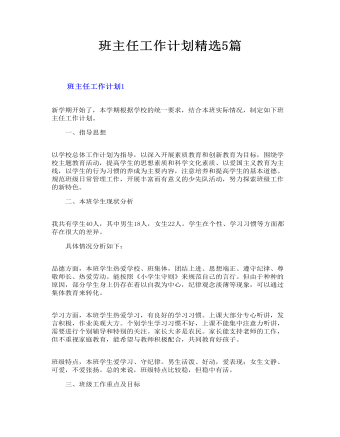
班主任工作计划精选5篇
我共有学生40人,其中男生18人,女生22人。学生在个性、学习习惯等方面都存在很大的差异。 具体情况分析如下: 品德方面,本班学生热爱学校、班集体,团结上进、思想端正、遵守纪律、尊敬师长、热爱劳动。能按照《小学生守则》来规范自己的言行。但由于种种的原因,部分学生身上仍存在着以自我为中心,纪律观念淡薄等现象,可以通过集体教育来转化。
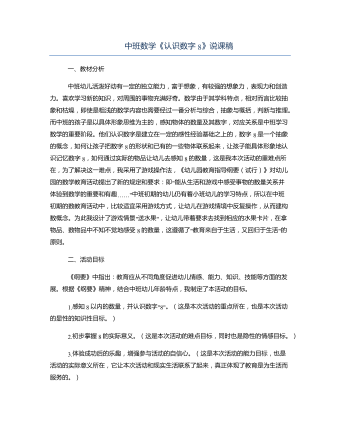
中班数学《认识数字8》说课稿
中班幼儿活泼好动有一定的独立能力,富于想象,有较强的想象力,表现力和创造力。喜欢学习新的知识,对周围的事物充满好奇。数学由于其学科特点,相对而言比较抽象和枯燥,即使是粗浅的数学内容也需要经过一番分析与综合,抽象与概括,判断与推理。而中班的孩子是以具体形象思维为主的,感知物体的数量及其数字,对应关系是中班学习数学的重要阶段。他们认识数字是建立在一定的感性经验基础之上的,数字8是一个抽象的概念,如何让孩子把数字8的形状和已有的一些物体联系起来,让孩子能具体形象地认识记忆数字8,如何通过实际的物品让幼儿去感知8的数量,这是我本次活动的重难点所在,为了解决这一难点,我采用了游戏操作法,《幼儿园教育指导纲要(试行)》对幼儿园的数学教育活动提出了新的规定和要求:即"能从生活和游戏中感受事物的数量关系并体验到数学的重要和有趣……"中班初期的幼儿仍有着小班幼儿的学习特点,所以在中班初期的数教育活动中,比较适宜采用游戏方式,让幼儿在游戏情境中反复操作,从而建构数概念。为此我设计了游戏情景"送水果",让幼儿带着要求去找到相应的水果卡片,在拿物品、数物品中不知不觉地感受8的数量,这遵循了"教育来自于生活,又回归于生活"的原则。
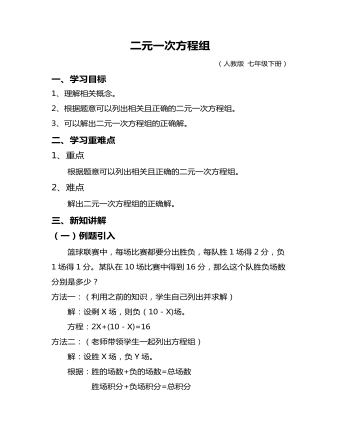
初中数学人教版二元一次方程组教学设计教案
(一)例题引入篮球联赛中,每场比赛都要分出胜负,每队胜1场得2分,负1场得1分。某队在10场比赛中得到16分,那么这个队胜负场数分别是多少?方法一:(利用之前的知识,学生自己列出并求解)解:设剩X场,则负(10-X)场。方程:2X+(10-X)=16方法二:(老师带领学生一起列出方程组)解:设胜X场,负Y场。根据:胜的场数+负的场数=总场数 胜场积分+负场积分=总积分得到:X+Y=10 2X+Y=16

